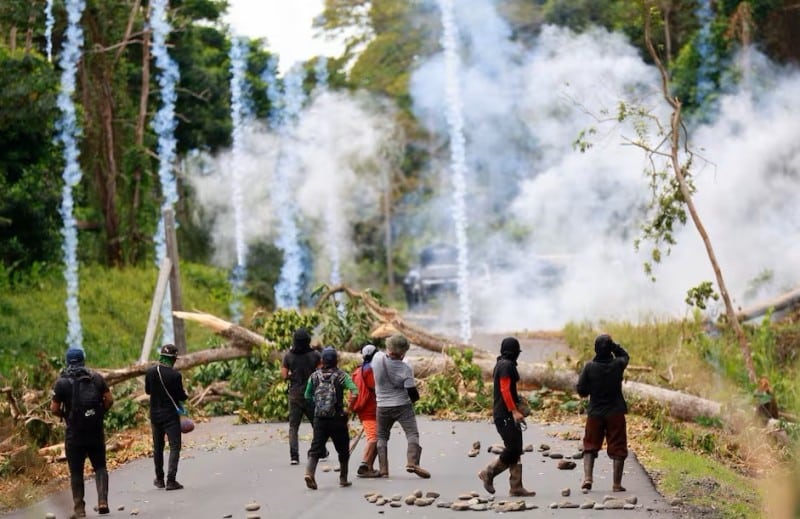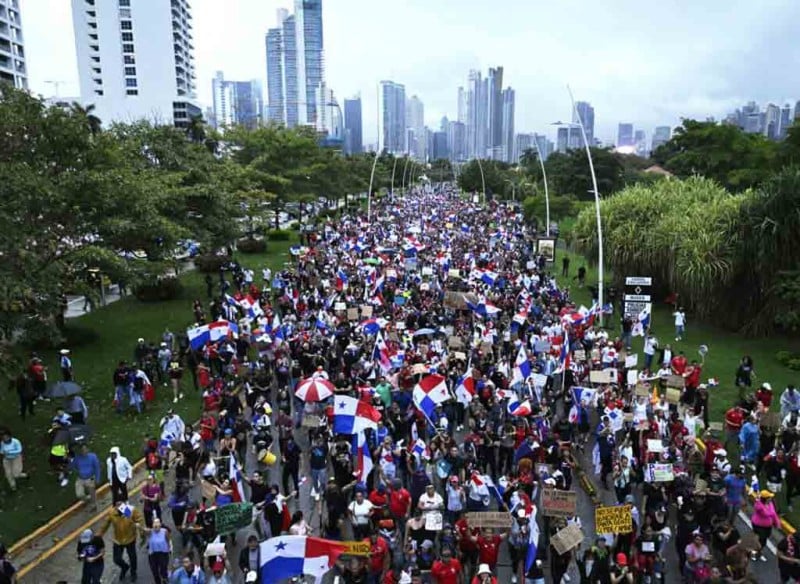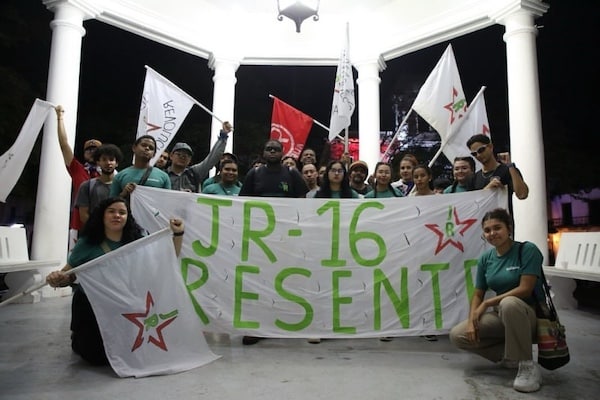Since April, Panama has been gripped by anti-government protests. What began as a teachers’ strike has grown to include students, nurses, banana pickers, anti-mining activists, and Indigenous peoples. These Panamanians are united by a desire to protect the social rights of citizens and to secure Panamanian sovereignty from U.S. imperialism and North American capital. These demands likely explain why the American and Canadian governments have remained silent regarding Panama’s mass upsurge of popular revolt—and the José Raúl Mulino government’s highly repressive response.
The Panamanian people are protesting a variety of policies pushed by the right-wing Mulino government, from a neoliberal social security reform called Law 462, to the labour policies of the American banana company Chiquita, to subservience toward the annexationist Trump administration, to the potential reopening of the widely disliked Cobre Panamá copper mine, owned by the Canadian company First Quantum Minerals.
Mulino’s police force has arrested hundreds, yet Canada and the U.S. have remained silent. Instead of speaking out against the crackdown on protest, President Trump and Prime Minister Carney appear more focused on stability that favours continued North American economic interests in Panama.
Formed in 2019, Juventudes Revolucionarias (JR, or JR-16) is a socialist organization made up of young Panamanian revolutionaries. They have organized against undemocratic constitutional reforms, Canadian mining, and U.S. imperialism. Now, they are engaged in resistance against the U.S.-backed Mulino government.
On June 26, Canadian Dimension spoke with JR member Joyner Myron Sánchez about the history of the group, Panama’s tradition of anti-imperialism, and ongoing efforts by Mulino and the U.S. government to repress Panamanians’ desire for meaningful national sovereignty. This conversation has been edited for length and clarity.
Canadian Dimension (CD): The governments of the U.S. and Canada have remained largely silent about the social uprising in Panama. As a result, many Canadians are unaware of the challenges Panamanians are currently facing. What do you think Canadians should know about the situation?
Joyner Myron Sánchez (JMS): Canadian people, and people in general, should know that we are living in a political situation that we consider a civil dictatorship. Why do we say that? If you disagree with the government, you may either go to jail or get murdered. This is not a new practice; however, the risk, the danger, is the worst that we have seen since the dictatorship that we had from 1968, into the 1970s, and through the 1980s.
This is the most important thing for people outside Panama to know: we are living in a right-wing dictatorship.
CD: When did JR-16 form?
JMS: JR was formed around 2019. The previous secretary general was named Omar Sandino.
In 2019, there were the first big protests of the past 30 years in Panama, since the period after the U.S. invasion of 1989. At that time [2019], it was because of some reforms that the government of that moment was trying to make to the Panamanian constitution. There were a lot of young people. In the 30 years after the U.S. invasion, there was a smaller number of young people in the streets. So we considered the importance of having an organization for young people. Because of Omar’s thinking, and my thinking, and the thinking of comrades at that time—we are Marxists—we decided to create JR as a Marxist-Leninist organization for young people.
In Panama, we didn’t have such things as youth organizations. In our history, it’s common to see university students or high school students being organized, but once you finish, those organizations disappear. There’s not a political structure. Also, in Panama, most young people do not have access to college or university. So that was the essence of our formation.
CD: Panama has long been a target of U.S. imperialism, and a site of anti-imperialist resistance. Who are JR’s influences? And what are JR’s goals at this moment? What is your organization doing on the ground?
JMS: In regard to our influences: we are a bunch of young people, between 15 and 30 years old, and what we have in common as an organization—not everyone might consider themselves Marxists or communists—is anti-imperialism. That’s part of the history of Panama. Most of us have a family member that disappeared, or got murdered, or got imprisoned under the dictatorship. Every Panamanian family has a family member who went missing because of the U.S. invasion of 1989.
The history of struggle against U.S. imperialism began in 1856, in the incident of the watermelon slice, when an American citizen took a slice of watermelon and refused to pay. Because of that, there was almost a civil war, because he refused to pay.
As many Latin American organizations, being anti-imperialists, we of course build a resistance, but we understand that we need power. In this situation we are experiencing right now, the only exit from this dictatorship is power. Our goal is to resist, but to resist to change, through actual power, the conditions of the Panamanian people.
CD: What sort of repression have the social movements faced during this ongoing resistance? What repression has JR faced?
JMS: In general, the repression against the social movements begins with the mainstream media. The government starts by using the media to try to make the rest of the people lose respect for the social organizations. The government begins by trying to make people lose respect for unions, educators, students, young people, and especially those who are left-wing. There were some unions of educators who went on strike, they stopped going to school. That was back in April. They were fighting against the law about social security, which is the main reason for the situation we have today.
On repression, there’s Panama and there’s the U.S. The U.S. has been continually sending representatives to Panama—Marco Rubio, Pete Hegseth, and so on. They have also been sending their army. The Marines were sent to Panama City.
Back in January, during our protest against the visit of Marco Rubio, we were attacked by a high-level cop, the third or fourth most important cop in the country. He came in person and attacked a woman, a comrade of ours, and started beating her. We defended ourselves. This was huge news. Two days after that, cops came to the houses of seven comrades with search warrants. They arrested two that day; the other five had a chance to move.
We were in hiding for 20 days. After that, with the help of some social movement lawyers, we went to the courts. Myself and four comrades, we went to jail for three days and one night. At 3 or 4 pm on the last day, cops wearing masks came to us and, without telling us where we were being taken to, led us to a “preventive” jail where people are kept before being transferred to prison. They put us in there, and they opened the gates so the rest of the prisoners could be close to us. One of the prisoners had a knife. The police do these things on purpose to try to intimidate us, and of course if something happens, if someone stabs us or rapes us, the government can say “it wasn’t us.” They do that on purpose with us.
We are forbidden to leave the country. Every month, we need to sign in at the Public Ministry. We have an order that says we cannot be near the specific cop who attacked us. Now the police put this guy in charge of every protest where we are present, so if we get next to him by mistake, they can grab us and send us to high-security prison.
We have the city Bocas del Toro, close to Costa Rica. You may have seen it in the media—it was covered in Telesur, Al Jazeera. The government suspended constitutional rights in Bocas del Toro. They started taking to jail whoever they wanted, going to their houses with guns, shooting people, stabbing people. They are doing basically the same that Bukele is doing with CECOT in El Salvador: shaving people’s heads, stripping them naked, it’s the same practice. And of course, that is because of the U.S. army influence in the police of Panama. As of June 26, the conditions of repression are extremely high.

José Raúl Mulino’s right-wing government declared a state of emergency in the province of Bocas del Toro, in the northwest region of Panama. Protesters blocked roads in opposition to a highly controversial pension reform law.
CD: As you mentioned, the repression in Bocas del Toro appears particularly intense. Why is that? What is the current situation in that province?
JMS: It’s important to remember that between 2009 and 2014, the current president, José Raúl Mulino, was minister of security for Ricardo Martinelli. During that time, they tried to make a law that we called the ley chorizo, a decree against the right to strike. Through this law they tried to take over the lands of Indigenous peoples. There was a huge movement of Indigenous people protesting in the street. Mulino’s answer was to kill them. At least 10 of them were murdered, specifically in the region close to Bocas del Toro. And the reason was this: they were Indigenous. That’s the reason the government took that decision.
The Indigenous movement in Panama has a strong history. Just recently we commemorated the 100-year anniversary of what we call the Dule Revolution. In 1925, Indigenous groups in Panama united in a war against the police, who were being pushed by the U.S. to take over Indigenous autonomy and lands, which we call “las comarcas.” For me, events in Bocas del Toro are just another chapter of the government being against Indigenous rights and protest.
CD: Despite Donald Trump threatening to annex the Panama Canal, President Mulino is working closely with the White House. When Mulino won the election in 2024, did you expect him to align so openly with the US?
JMS: Something interesting to mention is that two days before the election, Mulino wasn’t legally allowed to run because he had been in jail [in 2015], and so had Martinelli. Our political constitution says that if you are sentenced, you’re not allowed to run for president. But the Supreme Court of Panama held a meeting two days prior to the elections, and they decided to make an exception. Mulino was allowed to run. From that moment, the social movements knew the winner was already elected two days before the vote.
In the 1980s, Mulino was in the opposition of the dictatorship of that time. He got close to the United States. He was part of the group that asked for the U.S. military invasion in 1989. There are even pictures of him celebrating in the U.S. embassy—in the meantime, Panamanian people were being murdered by the U.S. army. Of course, we expected the current relationship between Mulino and the United States.
CD: Do you expect Mulino will try to reopen the Cobre Panamá mine?
JMS: Every Thursday, Mulino meets with a few journalists—journalists he chooses—and they ask him questions. They’ve asked him many times about the Canadian mining company. What he said is, “I’m pro-business. I have friends who are mining businessmen. Of course I’m going to consider reopening the mine.” And people say, “But in 2023, Panamanians went onto the street to protest the mine.” He says, “But those people are not businessmen, so I’m not going to listen to them.” That’s literally what he said in an interview. So we expect the mine to reopen, mostly likely this upcoming year.

People protest during a march against the government contract with Canadian mining company First Quantum and its subsidiary Minera Panama in Panama City.
CD: It appears, at least from the outside, that there is no clear left-wing party willing to adopt the demands of the Panamanian people. Is that true? How does JR view Panama’s electoral system at this moment?
JMS: There’s no clear left-wing party. However, in the 2024 election, there was maybe the biggest alliance we’ve had between all the left-wing movements. Even though we were almost the last-place party out of 13 candidates, we got more votes than before, and our thinking was better received. That was because there is an increase in the number of women and young people in the electoral system. They are becoming the biggest portion of the electoral vote.
Recently, we’ve seen more people, people you think would never be at the same table, who are now left-wing voters. JR is trying our best to build that unity.
Today’s situation represents maybe the best chance that we, as the left, have of getting closer to actual power. Not because of what our organization wants, but because of the actual material conditions that we as a people are experiencing: an anti-rights government, an anti-worker government. It’s making Panamanian people think, “maybe the left isn’t so bad.”
We are four years away from the next election, and a lot of things can happen, but our vision as JR is to keep building that unity. We want more people trying to get power. Last election, the left only presented a candidate for president, but we did not present candidates for senators or other positions. Next time, we need to try to get all the positions possible, not only the presidency.
CD: What is the future JR would like to see in Panama—and Latin America as a whole?
JMS: We dream of a Panama that is completely free, where there is no presence of U.S. imperialism anywhere. Our anthem begins by saying that we “finally reached victory.” That’s what we want. To finally get our true and only victory, which is to take out the boots of imperialism and lift our people up to build sovereignty, actual sovereignty.
In general, for Latin America, we want to preserve our autonomy and sovereignty, which is the only possible freedom for Latin Americans and the Panamanian people.
CD: How can Canadians support JR and the work that you do?
JMS: The most basic and important thing is to use social media to say “Hey, this is going on in Panama. Panama is under attack from U.S. imperialism. Panama is under attack from its right-wing government.” Because if people outside Panama think nothing is going on here, then the people inside Panama will think that what’s going on is normal.
This is maybe not the best example because of the different level of violence, but when you talk about the Palestinian situation, it became more widely known when people started publishing about it. That helps for the fight. That helps people realize what’s going on Palestine. The same can be done in Panama.

